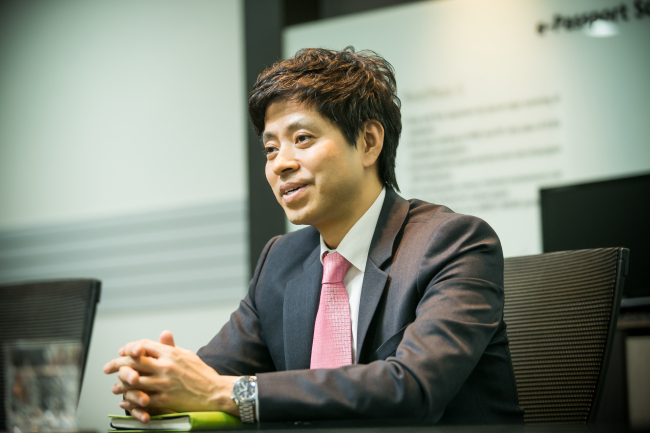[Herald Interview] Suprema seeks opportunity in mobile fingerprint scanner
By Shin Ji-hyePublished : Sept. 20, 2017 - 15:07
These days, the key is to go mobile, meaning integrating technologies and solutions onto mobile devices often become the make or break factor in the fast-changing industries.
The same goes for a Korean biometric tech firm, Suprema, which is the nation’s largest biometric access solution provider by sales specializing in fingerprint and facial recognition readers for home and businesses.
Moving to capitalize on the growth potential of mobile biometrics by expanding its business in fingerprint scanner algorithm for smartphones, the company recently developed its fingerprint scanner algorithm “BioSign” last year. It has, for the first time, provided BioSign for Samsung’s affordable smartphone models, Galaxy J5 and A7 series via SK Telecom, this year.
“We expect more budget smartphones will adopt fingerprint scanners in the next few years. That will be a good opportunity for us,” said Lee Jae-won, Suprema’s chief executive, in an interview with The Korea Herald.
BioSign is fit for budget, small-sized smartphones as the algorithm is capable of recognizing super-small sensors with the size of 3 millimeter x 4 millimeter. A small-sized sensor drives down the cost of smartphones.
The same goes for a Korean biometric tech firm, Suprema, which is the nation’s largest biometric access solution provider by sales specializing in fingerprint and facial recognition readers for home and businesses.
Moving to capitalize on the growth potential of mobile biometrics by expanding its business in fingerprint scanner algorithm for smartphones, the company recently developed its fingerprint scanner algorithm “BioSign” last year. It has, for the first time, provided BioSign for Samsung’s affordable smartphone models, Galaxy J5 and A7 series via SK Telecom, this year.
“We expect more budget smartphones will adopt fingerprint scanners in the next few years. That will be a good opportunity for us,” said Lee Jae-won, Suprema’s chief executive, in an interview with The Korea Herald.
BioSign is fit for budget, small-sized smartphones as the algorithm is capable of recognizing super-small sensors with the size of 3 millimeter x 4 millimeter. A small-sized sensor drives down the cost of smartphones.

Until last year, Samsung had used fingerprint scanners only for its premium lineups, Galaxy S and Note series, but the firm expanded the biometrics into its budget models, Galaxy J and A series, this year.
The J and A series are Samsung’s most sought-after models with combined sales standing at 190 million units last year, taking up more than 60 percent of the firm’s total smartphone sales.
“BioSign is not for a sole client. We are in talks with more handset makers, including Chinese firms, for further supply of the algorithm,” Lee said without disclosing the names of the firms.
Globally, budget smartphones that cost less than $500 are estimated to be more than 80 percent out of the total smartphone market.
Analysts are upbeat about BioSign’s future penetration in the mobile fingerprint scanner market due to its technical competitiveness and the growing trend of mobile biometrics.
“Suprema’s BioSign is expected to increase its presence in Samsung’s budget lineups. And considering the competitiveness of algorithm itself, BioSign may also be used for premium smartphones,” said Han Dong-hee, an analyst at Kiwoon Securities.
Developing algorithm that can recognize super-small sensors is very difficult because small sensors can read only a small portion of fingerprint information, Han added.
Fingerprint scanners are becoming a common sight for the latest smartphones. Apart from Samsung, most global handset makers, including Apple, Huawei, Sony, Oppo and Vivo, have also unveiled mobile fingerprint scanners.
Strategy Analytics predicted the mobile fingerprint scanner market will rise to 1.4 billion units by 2020 from 852 million units this year. Its portion in the total smartphone market is also expected to rise from 55 percent to 80 percent during the same period.
Suprema hopes to further push into the in-display fingerprint scanner, which is the next-generation mobile fingerprint scanner Apple and Samsung are competitively developing with the aim of launching it next year.
“BioSign can also be used for the in-display fingerprint scanner. We have competitiveness in that area as we already have strength in optical technologies from our mainstay, biometric access solution,” Suprema chief said.
The in-display fingerprint scanner, which uses optical technologies, will allow users to unlock their device by placing a finger on the screen. Currently, fingerprint scanners are placed on the back of smartphones sometimes making users accidentally touch the phone’s camera.
By Shin Ji-hye(shinjh@heraldcorp.com)







![[Graphic News] More Koreans say they plan long-distance trips this year](http://res.heraldm.com/phpwas/restmb_idxmake.php?idx=644&simg=/content/image/2024/04/17/20240417050828_0.gif&u=)
![[KH Explains] Hyundai's full hybrid edge to pay off amid slow transition to pure EVs](http://res.heraldm.com/phpwas/restmb_idxmake.php?idx=644&simg=/content/image/2024/04/18/20240418050645_0.jpg&u=20240419100350)






![[From the Scene] Monks, Buddhists hail return of remains of Buddhas](http://res.heraldm.com/phpwas/restmb_idxmake.php?idx=652&simg=/content/image/2024/04/19/20240419050617_0.jpg&u=20240419175937)

![[KH Explains] Hyundai's full hybrid edge to pay off amid slow transition to pure EVs](http://res.heraldm.com/phpwas/restmb_idxmake.php?idx=652&simg=/content/image/2024/04/18/20240418050645_0.jpg&u=20240419100350)

![[Today’s K-pop] Illit drops debut single remix](http://res.heraldm.com/phpwas/restmb_idxmake.php?idx=642&simg=/content/image/2024/04/19/20240419050612_0.jpg&u=)